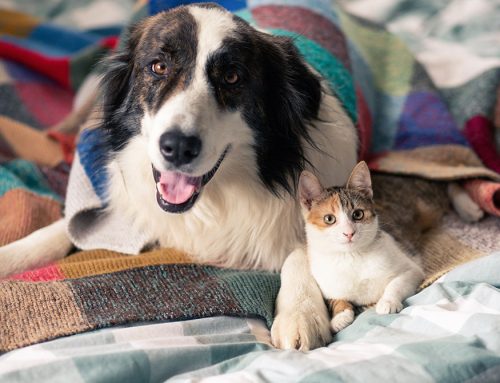What to do if your pet is licking its feet
One of the most common symptoms that I will see a pet for is excessive paw licking and the brown paw staining that goes with it. Most pet owners are unaware of what is causing it and take it as the pet just being annoying – clients will say to me – “Dr. Cooper, he licks a lot, but I just tell him to stop and he does”.
The question is why is your pet licking? The most common cause of these symptoms is underlying allergies. In people, most of our symptoms are on our face (running eyes, nose, clogged ears, and sneezing). In pets, the immune system is different and between the paw pads, in the armpits and groin, are the most concentrated areas to pick up pollens and other allergens. So really, it is the equivalent of me rubbing my eyes when the flare-ups start.
What can be done?
There are a lot of options for symptom control, and my recommendations are patient-specific. We are not going to take a jet plane if we can get there walking! I have patients on a new therapy that has them symptom-free for up to 4-8 weeks, while I have others that just need regular foot baths and preventative care. What helps me determine what steps to take in your pet are their specific symptoms, when they occur and how bad they are. Remembering always, that there are three main pillars of allergies (food, flea and environmental– aka SUPER BLOOM!). Each pillar stacks on top of one another, and if they are high enough to pass the patients threshold, you will see symptoms (paw licking, scratching, ear and skin infections, conjunctivitis, etc.).
Since I suffer from allergies, I understand how miserable it can make our pets – so like anything, the best treatment is prevention- and we see a lot of pets that benefit from these regimens. That said, May has already kept us busy as the super bloom is affecting a lot of our patients. I suspect as the weather continues to wax and wane between cold and damp then bright and sunny days, we are going to need to keep them controlled sooner before they turn into larger problems (many pets will suffer from secondary skin and ear infections when allergies run rampant).
Symptoms to watch for:
Cats:
- Chewing on paws, red or swollen paws
- Salivary brown stain on the paws
- Itchy or runny eyes
- Sneezing or coughing
- Increase scratching
- Rubbing
- Patchy or raised red areas
- Hair loss or bald spots
Dogs:
- Itchy Ears
- Itchy skin
- Constant paw licking
- Red inflamed skin
- Sneezing
- Itchy, runny eyes
How can I help your pet?
If you suspect your dog or cat has an allergy, give us a call so we can discuss your pet’s symptoms and what we can do to provide relief. We have several treatment options including medicated shampoos, special supplements, and prescription medications all tailored to alleviate your pet’s discomfort.
Give us a call today & schedule your pet’s check-up during the month of May and get $20 off the allergy relief, Cytopoint, which can provide 4 and more weeks of symptom relief.
Sources
https://healthypets.mercola.com/sites/healthypets/archive/2012/06/22/pets-seasonal-allergies.aspx
https://www.akc.org/expert-advice/health/dog-allergies-symptoms-treatment/







Leave A Comment